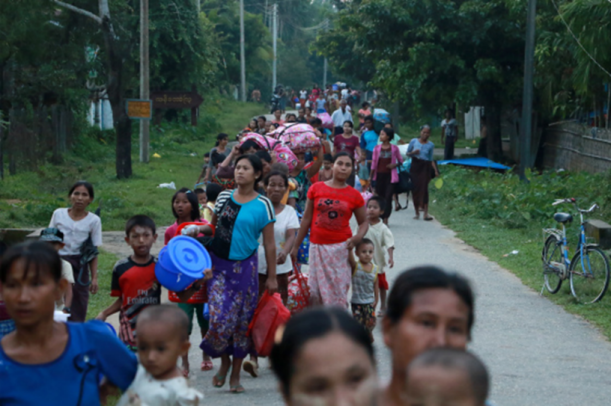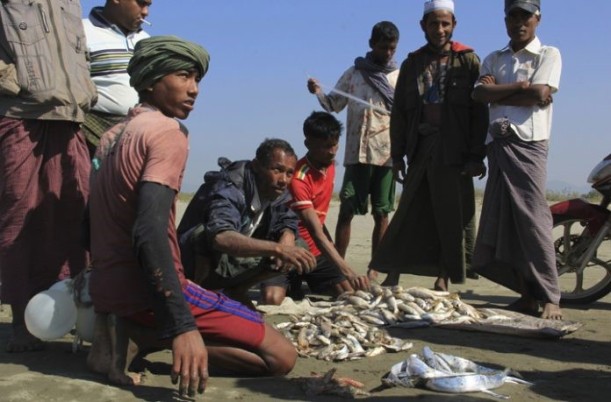Kia Roberts-Warren
Last semester, I discussed the dire situation of the Rohingya in Myanmar. It seemed like Ms. Aung San Suu Kyi was working to bring a peaceful solution with the Rohingya. The situation seemed hopeful. Yet, here we are once again discussing this situation.

“Things Have to Get Worse Before They can Get Better?”
On October 9, 2016, the situation escalated, resulting in death. The Harakah Al-Yaqin launched three predawn attacks on three police border posts.[1] One of the posts was the security headquarters; the assault involved several hundred assailants and included planting improvised explosive devices and setting an ambush on the approach road, delaying the arrival of army reinforcements, while the attackers looted the armory.[2] On November 12, 2016, in another encounter, a senior army officer was killed.[3]
The Tatmadew, the Myanmar military, retaliated with a counterinsurgency operation. This operation was disproportionate and failed to distinguish between civilians and combatants.[4] This resulted in about 1,500 buildings being torched in the township of Maungdew, an estimated 65,000 people have fled to Bangladesh as a result.[5] Documentation shows extrajudicial killings, rapes, arbitrary arrests, and beatings by the government security forces.[6] The Tatmadew have also almost entirely sealed off the northern area of Arakan in the Rakhine State.[7] The government has banned the Rohingya from using their boats to fish in order to “prevent insurgents from leaving or entering the country by sea,” leading to many risking their lives on makeshift rafts in order to get food for their families.[8]

These human rights violations by the Tatmadew have not been handled well by the government. The government has admitted that people have been found dead and that those arrested were suspected members of Harakah Al-Yaqin and their supporters.[9] However, the government’s rebuttal to the human rights abuses have been undesirable. The country’s Attorney General’s office have posted “Fake Rape” on its website to discredit reports that the Tatmadew officers have committed rape.[10] Furthermore, the government has denied accredited journalists and human rights investigators access to verify the abuse.[11] The government formed a special investigative committee led by former General Myint Swe (now Vice President of Myanmar) to look into the October violence. Unsurprisingly, the committee quickly dismissed any and all claims of misbehavior by security forces.[12]
However, a few weeks ago the advisory committee created by Aung San Suu Kyi and headed by Kofi Annan met with Rakhine Buddhists and Rohingya residents from two villages.[13] The Secretary of Kaman National Development Party, Tin Hlaing Win, met with the advisory committee to tell the committee about the Rohingyas losing their rights over the last four years and their wish to return home.[14] The committee told Win that that would submit their demands to the government with their recommendations.[15]
Over forty Myanmar-based civil society groups issued a statement asking for an independent investigation by the international community to into the human rights abuses by the Tatmadew.[16] Specifically, these groups requests that an investigation “fully assess the totality of the situation in Rakhine state and provide clear recommendations for the current government to effectively address and prevent further problems in the Rakhine state.”[17] This statement came a day before foreign ministers of the Organization for Islamic Cooperation, an intergovernmental body of 57 member nations, met in Malaysia to discuss the plight of the Rohingya in Rakhine state.[18]
“The Other Side of the Coin: Harakah Al-Yaqin”
Although many Rohingya are peaceful, the October attack was launched by a group of Rohingya that the International Crisis Group has labeled the group as a Muslim insurgency. The group Harakah Al-Yaqin (the Faith Movement) was established after the 2012 riots between Muslims and Buddhists and is currently a group of twenty Rohingya who have experience in modern guerilla warfare and are leading operations in Northern Arakan.[19] A committee of Rohingya emigres based in Mecca oversees Harakah Al-Yaqin.[20] The Harakah Al-Yaqin have obtained fatwas from senior clerics in Saudi Arabia, United Arab Emirates, and Pakistan to enhance its religious legitimacy, backing its cause under Islamic law.[21] The group has spent the last two years training hundreds of local recruits in guerilla warfare and explosives.[22] There are some indications of training and solidarity links with international jihadist organizations, but it is important to distinguish the aims and actions of the Harakah Al-Yaqin – to secure the rights of the Rohingya in Myanmar using insurgency tactics against security forces.[23]

“Momma is Stepping in”
As a result of the escalating violence and the actions of the Myanmar government, the United Nations human rights envoy to Myanmar, Yanghee Lee, went on her biannual 12-day visit in January.[24] Lee had discussed with Aung San Suu Kyi the security situation in the northern Rahkine State, the reports of the abuses by the security forces, and the increasing need for humanitarian assistance for people displaced by fighting between the government army and ethnic guerilla groups in war-torn Shan and Kachin states.[25]
Lee also met with Vice President Myint Swe, chairman of the special investigation committee, to question the investigation methods of the committee.[26] This was due to the interim report issued on January 3 that the rape allegations resulted insufficient evidence to take legal action and the accusations of torture, arson, and illegal arrests were still being investigated.[27] Moreover, Lee did not allow the authorities to join her when she visited villages in Maungdaw township to talk to residents.[28] She also met with Rohingya Muslims in adjacent Buthidaung township and visited the local prison there.[29] Yet, reports indicate she was denied access to certain areas.
Lee is to submit a report to the U.N. Human Rights Commission in March.[30]

“Where Do We Go From Here?”
The situation in Myanmar has left the international community thinking “what now?” Until Yanghee Lee releases her report in March, the advisory committee will continue talks with Rakhine Buddhists and Rohingyas in the Rakhine State. The committee will hopefully foster negotiations between the government and the Rohingya to help them attain such basic rights as citizenship, the right to life, access to government resources, among other rights. Meanwhile, the Rohingya continue to wait and suffer.
Unfortunately, the most complicated part of this situation is the intervention of Islamic countries, which only adds to the tension. These countries do not involve the government of Myanmar government in these conferences. Moreover, neither the UN nor the Myanmar government is addressing such involvement. Yet, the primacy of territorial sovereignty makes interference by other States into Myanmar a precarious situation.
Kia Roberts-Warren is a 3L at UB Law. She is concentrating in international law. Kia graduated from Temple University receiving a BA in East Asian Studies during that time she spent a semester in Tokyo, Japan. Kia has an interest in international trade and human rights. She is also interested in fashion law and art law in the international context. Last year, she held the position of Career Development Director of the International Law Society and participated in the 2016 Philip C. Jessup Moot Court Competition. She recently attended UB’s Aberdeen Summer Abroad Program.
[1] http://time.com/4601203/burma-myanmar-muslim-insurgency-rohingya/
[2] Id.
[3] Id.
[4] Id.
[5] https://www.nytimes.com/2017/01/16/opinion/the-rohingya-the-ladys-problem-from-hell.html?_r=0
[6] Id.
[7] Id.
[8] http://www.businessmirror.com.ph/banned-boats-myanmar-rohingya-fish-rafts-junk/
[9] https://www.nytimes.com/2017/01/16/opinion/the-rohingya-the-ladys-problem-from-hell.html?_r=0
[10] Id.
[11] Id.
[12] Id.
[13] http://www.rfa.org/english/news/myanmar/un-rights-envoy-meets-with-aung-san-suu-kyi-to-discuss-volatile-rakhine-state-01182017160404.html
[14] Id.
[15] Id.
[16] Id.
[17] Id.
[18] Id.
[19] http://time.com/4601203/burma-myanmar-muslim-insurgency-rohingya/
[20] Id.
[21] Id.
[22] Id.
[23] Id.
[24] http://www.rfa.org/english/news/myanmar/un-rights-envoy-meets-with-aung-san-suu-kyi-to-discuss-volatile-rakhine-state-01182017160404.html
[25] Id.
[26] Id.
[27] Id.
[28] Id.
[29] Id.
[30] Id.





